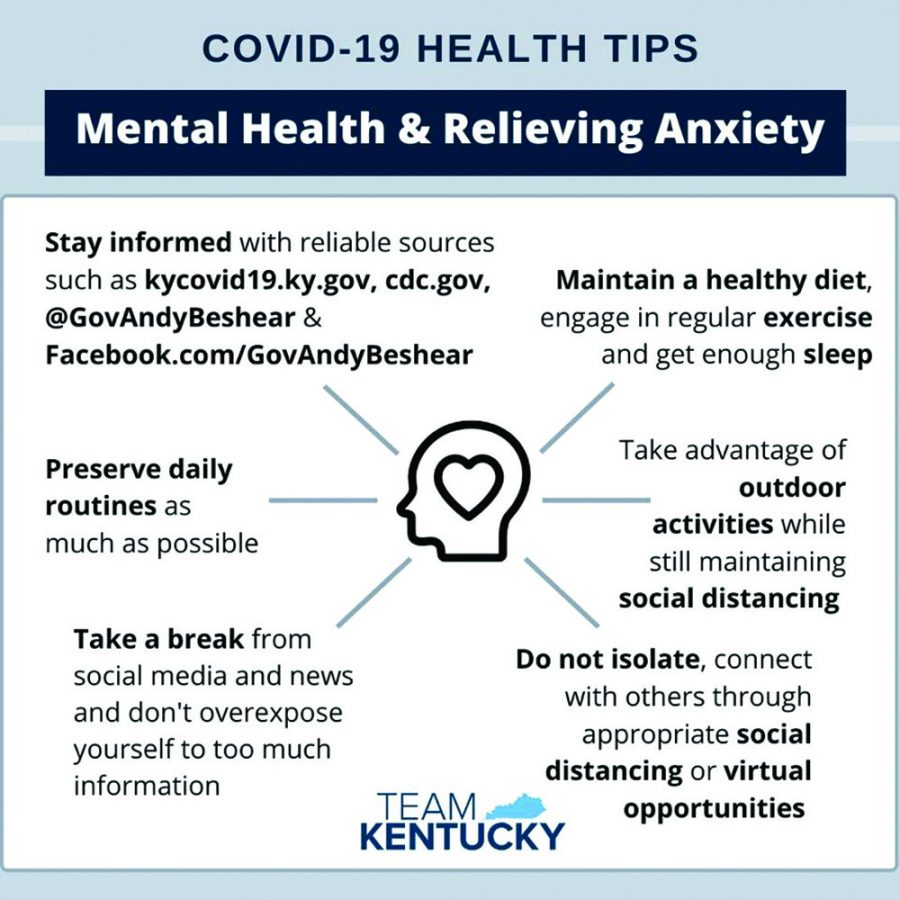Quarantine comes with consequences
Social distancing is harming the mental health of those with disorders
Courtesy of The Winchester Sun
This chart gives a few examples of ways to cope with anxiety during COVID-19. Following these will result in keeping yourself healthier and safer. Graphic by Team Kentucky member, Whitney leggett
April 14, 2020
For about the past month, the world has been completely flipped upside down. Schools have been shut down, and families have been told to stay in the comfort of their own homes. Social distancing has been very encouraged all over in hopes of getting this whole situation over quicker.
During this chaotic time, some people have taken up new hobbies, focused on their personal health and taken the time to organize themselves, but not everyone is coping with social distancing in the same way. For those who have mental disorders or unhealthy mental states, this can be a very dangerous and scary time. Although we are thinking about the people we need to protect from the virus, we must also consider the people struggling on the inside.
According to ScienceNews, of 2760 quarantined people, 34% of them reported high levels of psychological distress. Not all of these individuals even had a mental disorder, so if quarantine can affect those that are mentally stable, it shows how it’s even more damaging to those with the disorders.
To many psychologists’ studies, this time of isolation can worsen depression, and while many of us are not set to a strict schedule or structure, it can worsen those with addictions or psychosis. It can be very scary to the people who are used to doing the same thing every day and now their life completely spirals out of control the next.
Think about the people with depression or other similar conditions. They no longer get to do the things they enjoy with their friends, clubs and/or extracurricular activities. These are the things that distract them and keep them to their best mental state. While no longer being able to do these things, it is very concerning considering the fact that they are now stuck inside, alone for some portions of the time with their own thoughts.
According to Chicago Tribune, people suffering from anxiety, social anxiety, panic disorder or anything related already have trouble with going to events and different places. Now that they are stuck in their own space, it makes their world even smaller, and in the future will just make it more difficult to go back out again. Fear of infection, frustration, finances and receiving false information are a few more stressors than can bring worry and stress onto a person.
If someone you know is dealing with a mental disorder, it’s important to help them cope in a healthy way. Establishing a simple daily routine for people with anxiety or obsessive compulsive disorder (OCD) can help ease some of the tension and/or stress that comes with quarantining. Making sure you socialize and interact with the people around you and keeping busying is also very important. Many therapists and organizations have gone online to make it possible for patients to still reach out to them if need be.
In times like these, people’s psychological health can decrease even if it wasn’t preexisting and can experience some of the same feelings. It is still important to make sure to keep a healthy routine and be active throughout the course of this. According to ABC News, “stress, anxiety and depression are normal and expected in the context of this pandemic. Experts, however, are particularly worried about people who are predisposed to depression and anxiety.” It just requires a little more attention and self-care for yourself if you do have pre-existing disorders.
Of course, social distancing is something that we cannot really control and something that everyone will have to push through. But for those with mental disorders, it’s important to still consider them and try to help in any way possible to make this time as easy as possible. If you know someone with a disorder, take some time out of your day to check up on them.







